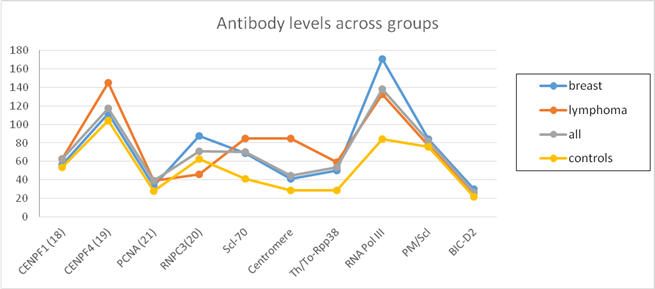Session Information
Date: Monday, November 6, 2017
Title: Systemic Lupus Erythematosus – Clinical Aspects and Treatment Poster II: Damage and Comorbidities
Session Type: ACR Poster Session B
Session Time: 9:00AM-11:00AM
Background/Purpose: Patients with systemic lupus (SLE) have altered cancer profiles compared to the general population, with a higher risk of some cancers (e.g. lymphoma) and apparently a lower risk of others (e.g. breast). Tumor-associated antibodies to centromere proteins and other antigens have been reported in many types of cancers (including lymphoma and breast) and may serve as diagnostic or prognostic indicators. Our purpose was to compare the prevalence of an array of tumor-associated antibodies in SLE patients with and without cancer.
Methods: We performed a case-control study nested within a large cohort of SLE patients followed at a clinic in Montreal, Canada. These patients have been consecutively enrolled and followed yearly with sera stored at each visit. Cancer events were ascertained by linkage with the Quebec tumor registry. In this analysis, we performed a cross-sectional analysis of antibodies in 23 SLE patients who developed a new cancer after SLE cohort entry, and compared them to 23 SLE cancer-free controls, frequency matched for sex, race/ethnicity and time since cohort entry. We assessed antibodies that in the literature had previously been suggested as associated with cancer in rheumatic disease and/or general populations. These included, but were not limited to, antibodies against anti-centromere protein (CENP), proliferating cell nuclear antigen (PCNA), Scl-70, and RNA polymerase III.
Results: Of the cancers in the 23 SLE patients, 11 were lymphoma, 8 were breast, two were endometrial, and 1 each were colon and kidney. The average age at cancer diagnosis was 52.3 years (standard deviation, SD 13.1) and the median SLE duration at cancer diagnosis was 14 years. The vast majority (91.3%) of the SLE patients with cancer were white and all but two of the SLE cancer cases were women.
For all antibodies examined, there were trends for higher levels in SLE cancer cases as a group, versus cancer-free SLE controls. Certain antibodies were found more often in specific cancer types, such as anti-RNA Pol III antibodies in breast cancer, and anti-CENPF1, anti-CENPF-4, and anti-centromere antibodies in lymphoma.
TABLE AND FIGURE SHOW MEDIAN LEVELS OF ANTIBODIES IN EACH GROUP
|
|
CENPF1 (n=18) |
CENPF4 (n=19) |
PCNA (n=21) |
RNPC3 (n=20) |
Scl-70 |
Centromere |
Th/To-Rpp38 |
RNA Pol III |
Th/To-Rpp25 |
PM/Scl |
BIC-D2 |
|
breast |
56.5 |
111.5 |
33.5 |
87.5 |
69 |
41.5 |
50.25 |
170.5 |
25 |
84.25 |
30 |
|
lymphoma |
63 |
145 |
39 |
46 |
85 |
85 |
59 |
132.5 |
21 |
77 |
26 |
|
all |
63 |
117 |
39 |
71 |
70 |
45 |
53.5 |
138 |
25 |
82 |
27 |
|
controls |
54 |
104 |
28 |
63 |
41 |
29 |
29 |
84 |
20 |
76 |
22 |
Conclusion : In the SLE patients with cancer, the levels of certain tumor-related antibodies tended to be higher than the levels in SLE patients who were cancer-free. This may suggest potential roles for these as cancer markers, but further research is needed.
To cite this abstract in AMA style:
Bernatsky S, Clarke AE, Rauch J, Pineau C, Vinet E, Fritzler MJ. Tumor-Related Autoantibodies and Cancers in SLE: A Case-Control Study from a Single Centre [abstract]. Arthritis Rheumatol. 2017; 69 (suppl 10). https://acrabstracts.org/abstract/tumor-related-autoantibodies-and-cancers-in-sle-a-case-control-study-from-a-single-centre/. Accessed .« Back to 2017 ACR/ARHP Annual Meeting
ACR Meeting Abstracts - https://acrabstracts.org/abstract/tumor-related-autoantibodies-and-cancers-in-sle-a-case-control-study-from-a-single-centre/

